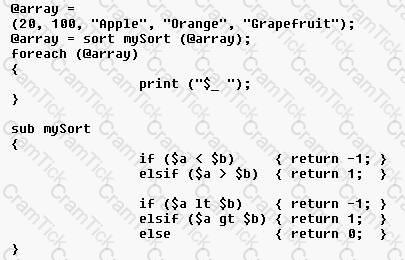Consider the following code block:
BEGIN {print ("Jan ");}
BEGIN {print ("Feb ");}
END {print ("Mar ");}
END {print ("Apr ");}
Print ("May ");
What is the result of this code block?
The filehandle INPUT is associated with the file represented by $file. Which statement will close the filehandle INPUT?
Consider the following program code:
$x = 10;
LOOP: while ($x < 15)
{
print ($x );
if ($x >= 14 && $x <= 20)
{
$x += 2;
redo LOOP;
}
else
{
$x++;
}
}
What is the result of executing this program code?
Consider the following program code:
%hash = (small => 8oz,
medium => 16oz,
large => 32oz);
@keys = sort(keys(%hash));
for ($i = 0; $i < 3; $i++) {
print($hash{$keys[$i]}\n);
}
What is the result of executing this program code?
Which of the following choices demonstrates the correct syntax to pass the argument $arg2 to the subroutine getpass?
Consider the program code in the attached exhibit. What is the result of executing this program code?

Consider the following command:
perl runme.pl arg1 arg2 arg3
Given this command issued on the command line, what is the value of @ARGV?
Consider the following program code:
if ("Apple" gt "Pear")
{
print("True ");
}
else
{
print("False ");
}
if ("Banana" le "Banana")
{
print("True ");
}
else
{
print("False ");
}
What is the result of executing this program code?
Consider the program code in the attached exhibit. What is the result of executing this program code?

Consider the following lines of code:
@array1 = ("apples", "oranges", "pears", "plums");
foreach (@array1) {print "$_\n"};
What is the result of these lines of code?
Which one of the following while statements uses correct syntax and expressions?
Which line of code represents the correct syntax to establish a reference to a database handle?
Which of the following choices demonstrates the correct syntax to pass a reference to a subroutine?
Which of the following tasks is the least effective in reducing errors in Perl scripts?
Which of the following code segments correctly readies a database query, creating a valid statement handle and a result set? Assume $dbh represents a valid database handle.
Which of the following correctly creates a SQL statement that will insert the values of the $name and $age variables into a database? The statement is assigned to the $sqlStmt variable. Assume a CHAR data type for $name and an INT data type for $age.
Master CIW Enterprise Developer | 1D0-437 Questions Answers | 1D0-437 Test Prep | CIW PERL FUNDAMENTALS Questions PDF | 1D0-437 Online Exam | 1D0-437 Practice Test | 1D0-437 PDF | 1D0-437 Test Questions | 1D0-437 Study Material | 1D0-437 Exam Preparation | 1D0-437 Valid Dumps | 1D0-437 Real Questions | Master CIW Enterprise Developer 1D0-437 Exam Questions